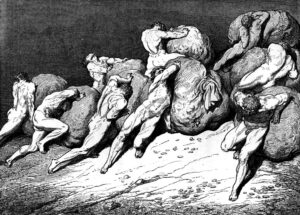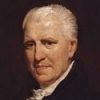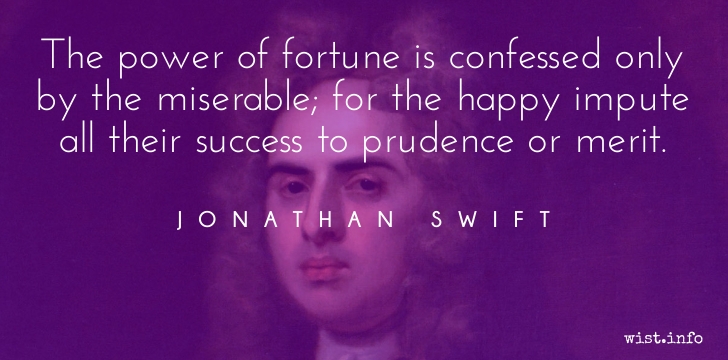He that waits upon Fortune, is never sure of a Dinner.
Benjamin Franklin (1706-1790) American statesman, scientist, philosopher, aphorist
Poor Richard (1734 ed.)
(Source)
Quotations about:
fortune
Note not all quotations have been tagged, so Search may find additional quotes on this topic.
In the fields of observation, chance favors only the prepared mind.
[Dans les champs de l’observation, le hasard ne favorise que les espirits préparés.]
Louis Pasteur (1822-1895) French chemist, pharmacist, microbiologist
Speech, as new Dean of Science, University of Lille, France (1854-12-07)
(Source)
Often misattributed to Ansel Adams. It was, though, Adams' favorite aphorism, which he usually paraphrased as to "Chance favors the prepared mind."
You never know what worse luck your bad luck has saved you from.
Cormac McCarthy (1933-2023) American novelist, playwright, screenwriter
No Country for Old Men (2005)
(Source)
Chance is necessity hidden behind a veil.
[Zufall ist die in Schleier gehüllte Nothwendigkeit.]
Marie von Ebner-Eschenbach (1830-1916) Austrian writer
Aphorisms [Aphorismen], No. 10 (1880) [tr. Scrase/Mieder (1994)]
(Source)
There are such things as to speak well, to speak easily, to speak correctly, and to speak seasonably. We offend against the last way of speaking if we mention a sumptuous entertainment we have just been present at before people who have not had enough to eat; if we boast of our good health before invalids; if we talk of our riches, our income, and our fine furniture to a man who has not so much as an income or a dwelling; in a word, if we speak of our prosperity before people who are wretched; such a conversation is too much for them, and the comparison which they then make between their condition and ours is very painful.
[Il y a parler bien, parler aisément, parler juste, parler à propos. C’est pécher contre ce dernier genre que de s’étendre sur un repas magnifique que l’on vient de faire, devant des gens qui sont réduits à épargner leur pain; de dire merveilles de sa santé devant des infirmes; d’entretenir de ses richesses, de ses revenus et de ses ameublements un homme qui n’a ni rentes ni domicile; en un mot, de parler de son bonheur devant des misérables: cette conversation est trop forte pour eux, et la comparaison qu’ils font alors de leur état au vôtre est odieuse.]
Jean de La Bruyère (1645-1696) French essayist, moralist
The Characters [Les Caractères], ch. 5 “Of Society and Conversation [De la Société et de la Conversation],” § 23 (5.23) (1688) [tr. Van Laun (1885)]
(Source)
(Source (French)). Alternate translations:
Some men talk well, easily, justly, and to the purpose: those offend in the last kind, who speak of the Banquets they are to be at, before such as are reduc'd to spare their Bread; of sound Limbs, before the Infirm; of Demesnes and Revenues, before the Poor and Needy; of fine Houses and Furniture, before such as have neither Dwelling or Moveables: in a word, who speak of Prosperity, before the Miserable. This conversation is too strong for 'em, and the comparison you make between their condition and yours is odious.
[Bullord ed. (1696)]
There is speaking well, speaking easily, speaking justly, and speaking seasonably: 'Tis transgressing the last rule, to speak ofthe sumptuous Entertainments you have made, before such as are reduc'd to want of Bread; of a healthy Constitution of Body, before the Infirm; of Demesnes, Revenues and Furniture, before a Man who has neither Dwelling, Rents, nor Movables; in a word, to speak of your Prosperity before the Miserable: this Conversation is too strong from them, and the Comparison they make between their Condition and yours is odious.
[Curll ed. (1713)]
There is speaking well, speaking easily, speaking justly, and speaking seasonably: It is offending against the last, to speak of Entertainments before the Indigent; of sound Limbs and Health before the Infirm; of Houses and Lands before one who has not so much as a Dwelling; in a Word, to speak of your Prosperity before the Miserable; this Conversation is cruel, and the Comparison which naturally rises in them betwixt their Condition and yours is excruciating.
[Browne ed. (1752)]
There is a difference between speaking well, speaking easily, speaking with judgement and speaking opportunely. We fail in this last respect when we enlarge upon the splendid meal we have just enjoyed in front of people who have to be thrifty of their bread; or boast of our health in the presence of invalids; or talk about our wealth, our fortune and property to a man who has neither home nor income; in a word, when we speak of our happiness in front of those who are wretched; such conversation is too painful for them, and the comparison they are bound to make between your state and their own is intolerable.
[tr. Stewart (1970)]
As favour and riches forsake a man, we discover in him the foolishness they concealed, and which no one perceived before.
[À mesure que la faveur et les grands biens se retirent d’un homme, ils laissent voir en lui le ridicule qu’ils couvraient, et qui y était sans que personne s’en aperçût.]Jean de La Bruyère (1645-1696) French essayist, moralist
The Characters [Les Caractères], ch. 6 “Of Gifts of Fortune [Des Biens de Fortune],” § 4 (6.4) (1688) [tr. Van Laun (1885)]
(Source)
(Source (French)). Alternate translations:
When Riches and Favour forsake a Man, we see presently he was a Fool, but no body could find it out in his Prosperity.
[Bullord ed. (1696)]
In proportion as Riches and Favour forsake a Man, we discover he was a Fool, which no body cou'd find out in his Prosperity.
[Curll ed. (1713)]
As Riches and Favour forsake a Man, we discover him to be a Fool, but no body could find it out in his Prosperity.
[Browne ed. (1752)]
As a man falls out of favour and his wealth declines, we discover for the first time the ridiculous aspects of his character, which were always there but which wealth and favour had concealed.
[tr. Stewart (1970)]
Lucky yet sad? My friend, should Fortune find
You lacking gratitude, she’ll change her mind.[Tristis es et felix. Sciat hoc Fortuna caveto:
Ingratum dicet te, Lupe, si scierit.]Martial (AD c.39-c.103) Spanish Roman poet, satirist, epigrammatist [Marcus Valerius Martialis]
Epigrams [Epigrammata], Book 6, epigram 79 (6.79) (AD 91) [tr. B. Hill (1972)]
(Source)
"To Lupus." (Source (Latin)). Alternate translations:
Th' art rich & sad; take heed lest fortune know;
She 'll call th' unthankefull, Lupus, if she do.
[tr. May (1629)]
How? sad and rich? Beware lest Fortune catch
Thee, Lupus, then she'll call thee thankless wretch.
[tr. Fletcher (1656)]
Th'art rich and sad; take heed lest Fortune see,
And, as ungrateful, do proceed with thee.
[tr. Killigrew (1695)]
What! sad and successfull! let Fortune not know.
Ingrate! would she brand thee, did she see thee so.
[tr. Elphinston (1782), Book 12, ep. 88]
You are sad in the midst of every blessing. Take care that Fortune does not observe, or she will call you ungrateful.
[tr. Bohn's Classical (1859)]
You are sad, although fortunate. Take care Fortune does not know this; "Ingrate" will be her name for you, Lupus, if she knows.
[tr. Ker (1919)]
In spite of your luck you seem gloomy of late:
Take care, or Dame Fortune will dub you 'Ingrate.'
[tr. Pott & Wright (1921)]
You are sad and lucky. Mind you don't let Fortune know. She will call you ungrateful, Lupus, if she gets to know.
[tr. Shackleton Bailey (1993)]
Lupus, you're sad, though lucky. Don't disclose it.
Fortune will call you thankless if she knows it.
[tr. McLean (2014)]
You've got it all, Lupus, but you're glum, moping, dour.
Do you want Fortune to think you're ungrateful to her?
[tr. D. Hill (2023)]
Fortune sumtimes shows us the way, but it iz energy that achieves sucksess.
[Fortune sometimes shows us the way, but it is energy that achieves success.]
Josh Billings (1818-1885) American humorist, aphorist [pseud. of Henry Wheeler Shaw]
Everybody’s Friend, Or; Josh Billing’s Encyclopedia and Proverbial Philosophy of Wit and Humor, ch. 131 “Affurisms: Plum Pits (1)” (1874)
(Source)
FOOL: He that has and a little tiny wit,
With hey, ho, the wind and the rain,
Must make content with his fortunes fit,
Though the rain it raineth every day.William Shakespeare (1564-1616) English dramatist and poet
King Lear, Act 3, sc. 2, l. 81ff (3.2.81-84) (1606)
(Source)
But what is there in man’s precarious life
To be relied on? o’er the foamy deep
Rides the swift vessel by the wind impell’d:
But as to human fortunes, Time reduces
The great to nothing, and augments the small.Euripides (485?-406? BC) Greek tragic dramatist
Bellerophon [Βελλεροφῶν], frag. 304 (TGF) (c. 430 BC) [tr. Wodhull (1809)]
(Source)
Barnes frag. 117, Musgrave frag. 20. Alternate translations:
Where indeed is there sureness in man's life? For swift ships the winds drive a straight path on the ocean deep, but men's fortunes are changed by the largeness of time, their greatness to nothing, while with increase for the lesser ....
[tr. Collard, Hargreaves, Cropp (1995)]
Where -- where --
for those that die
life’s sure foundation? If we were ships
over the depths of ocean
winds would drive us
straight.
But those that die
their fortune shifts, it veers
in twists of fate -- as Time
(slowly --– slowly) generates itself
at its own leisure
reducing what was great
to nothing – raising up
another ....
[tr. Stevens (2012)]
KENT: Fortune, good-night. Smile once more; turn thy wheel.
William Shakespeare (1564-1616) English dramatist and poet
King Lear, Act 2, sc. 2, l. 188 (2.2.188) (1606)
(Source)
Now, now, my sister, the Fates are in command.
Don’t hold me back. Where God and relentless
Fortune call us on, that’s the way we go![Iam iam fata, soror, superant; absiste morari;
quo deus et quo dura vocat Fortuna, sequamur.]Virgil (70-19 BC) Roman poet [b. Publius Vergilius Maro; also Vergil]
The Aeneid [Ænē̆is], Book 12, l. 676ff (12.676-677) [Turnus] (29-19 BC) [tr. Fagles (2006)]
(Source)
Declaring to his sister that, despite her attempts to protect him, Fate dictates he face Aeneas in (likely fatal) battle.
(Source (Latin)). Alternate translations:
Fate calls now, sister, there is no delay:
What God and hard chance bids, we must obey.
[tr. Ogilby (1649)]
Sister, the Fates have vanquish'd: let us go
The way which Heav'n and my hard fortune show.
[tr. Dryden (1697)]
Sister, now, now, destiny prevails; forbear to stop me; let us follow whither god and rigid fortune calls.
[tr. Davidson/Buckley (1854)]
The Fates, the Fates must have their way:
O sister! cease to breed delay:
Where Heaven and cruel Fortune call,
There let me follow to my fall.
[tr. Conington (1866)]
Now, sister, now the fates prevail.
Bid me not pause. Wherever Heaven may lead
And Fortune stern, let us pursue our course.
[tr. Cranch (1872), l. 856ff]
Now, O my sister, now fate prevails: cease to hinder; let us follow where deity and stern fortune call.
[tr. Mackail (1885)]
Now, sister, now the Fates prevail! no more for tarrying try.
Nay, let us follow where the God, where hard Fate calleth me!
[tr. Morris (1900)]
"Sister," he cries, "Fate conquers; let us go
The way which Heaven and cruel fortune show."
[tr. Taylor (1907), st. 88, l. 787ff]
Fate is too strong, my sister! Seek no more
to stay the stroke. But let me hence pursue
that path where Heaven and cruel Fortune call.
[tr. Williams (1910)]
Now, my sister, now Fate triumphs: cease to hinder; where God and cruel Fortune call, let us follow!
[tr. Fairclough (1918)]
Fate is the winner now; keep out of my way,
My sister: now I follow god and fortune.
[tr. Humphries (1951)]
The fates are too strong for me, sister -- I see it now. Don't hold me back;
Let me go where God and my own unmerciful fortune call me.
[tr. Day-Lewis (1952)]
Sister, fate has won; do not
delay me; let us follow where both god
and cruel fortune call.
[tr. Mandelbaum (1971), l. 900ff]
Ah, sister, see, fate overpowers us.
No holding back now. We must follow where
The god calls, or implacable Fortune calls.
[tr. Fitzgerald (1981), l. 915ff]
"Sister," he said, "the time has come at last. The Fates are too strong. You must not delay them any longer. Let us go where God and cruel fortune call me."
[tr. West (1990)]
Now, sister, now fate triumphs: no more delays:
where god and cruel fortune calls, let me follow.
[tr. Kline (2002)]
Now, Sister, the Fates triumph at last.
Stop holding me back. We will follow
Where God and cruel Fortune call us.
[tr. Lombardo (2005)]
Sister, fate has won. Stop delaying me.
Let's go where Jove and heartless Fortune call.
[tr. Bartsch (2021)]
Blest is the man who cheats the stormy sea
And safely moors beside the sheltering quay;
So, blest is he who triumphs over trial.
One man, by various means, in wealth or strength
Outdoes his neighbour; hope in a thousand hearts
Colours a thousand different dreams; at length
Some find a dear fulfilment, some denial.
But this I say,
That he who best
Enjoys each passing day
Is truly blest.[εὐδαίμων μὲν ὃς ἐκ θαλάσσας
ἔφυγε χεῖμα, λιμένα δ᾽ ἔκιχεν:
εὐδαίμων δ᾽ ὃς ὕπερθε μόχθων
ἐγένεθ᾽: ἑτέρᾳ δ᾽ ἕτερος ἕτερον
ὄλβῳ καὶ δυνάμει παρῆλθεν.
μυρίαι δ᾽ ἔτι μυρίοις
εἰσὶν ἐλπίδες: αἳ μὲν
τελευτῶσιν ἐν ὄλβῳ
βροτοῖς, αἳ δ᾽ ἀπέβησαν:
τὸ δὲ κατ᾽ ἦμαρ ὅτῳ βίοτος
εὐδαίμων, μακαρίζω.]Euripides (485?-406? BC) Greek tragic dramatist
Bacchæ [Βάκχαι], l. 902ff (Stasimon 3, Epode) [Chorus/Χορός] (405 BC) [tr. Vellacott (1973)]
(Source)
(Source (Greek)). Alternate translations:
Blest is the man who 'scapes the stormy wave.
And in the harbour finds repose:
He too is blest, 'midst dangers brave,
Who soars above the malice of his foes:
And now these, now those possess
Superior talents or success;
Distinct their aims; but hope each bosom fires.
There are, a rich encrease who find,
The vows of some are scatter'd in the wind:
But in my judgement blest are they
Who taste, tho' only for the day.
The joys their soul desires.
[tr. Wodhull (1809)]
Happy is he who has fled a storm on the sea, and reached harbor. Happy too is he who has overcome his hardships. One surpass another in different ways, in wealth or power. There are innumerable hopes to innumerable men, and some result in wealth to mortals, while others fail. But I call him blessed whose life is happy day today.
[tr. Buckley (1850)]
Who hath 'scaped the turbulent sea,
And reached the haven, happy he!
Happy he whose toils are o'er
In the race of wealth and power!
This one her, and that one there,
Passes by, and everywhere
Still expectant thousands over
Thousands hopes are seen to hover,
Some to mortals end in bliss;
Some have already fled away:
Happiness alone is his
That happy is to-day.
[tr. Milman (1865)]
Happy he, who from the storm,
Has the breaker escaped, and the harbour has reached;
Happy he who after toil
Is the victor, for many the ways in which man
Wins him power, and wins him wealth.
Thousand-fold ever to thousands of men,
Hope follows upon hope,
With some it grows unceasingly,
With some it wastes to nothingness.
But he whose life is ever fresh,
Lives in unbroken happiness.
[tr. Rogers (1872), l. 865ff.]
Happy is he who hath escaped the wave from out the sea, and reached the haven; and happy he who hath triumphed o’er his troubles; though one surpasses another in wealth and power; yet there be myriad hopes for all the myriad minds; some end in happiness for man, and others come to naught; but him, whose life from day to day is blest, I deem a happy man.
[tr. Coleridge (1891)]
Blest who from ravening seas
Hath 'scaped to haven-peace,
Blest who hath triumphed in endeavour's toil and throe.
This man to higher height
Attains, of wealth, of might,
Than that; yet myriad hopes in myriad hearts still glow:
To fair fruition brought
Are some, some come to nought:
Happy is he whose bliss from day to day doth grow.
[tr. Way (1898)]
Happy he, on the weary sea
Who hath fled the tempest and won the haven.
Happy whoso hath risen, free,
Above his striving. For strangely graven
Is the orb of life, that one and another
In gold and power may outpass his brother.
And men in their millions float and flow
And seethe with a million hopes as leaven;
And they win their Will, or they miss their Will,
And the hopes are dead or are pined for still;
But whoe'er can know,
As the long days go,
That To Live is happy, hath found his Heaven!
[tr. Murray (1902)]
-- Blessèd is he who escapes the storm at sea,
who comes home to his harbor.
-- Blessèd is he who emerges from under affliction.
-- In various ways one man outraces another in the race for wealth and power.
-- Ten thousand men possess ten thousand hopes.
-- A few bear fruit in happiness; the others go awry.
-- But he who garners day by day the good of life, he is happiest. Blessèd is he.
[tr. Arrowsmith (1960)]
Happy the man who from the sea
escapes the storm and finds harbor;
happy he who has surmounted
toils; and in different ways one surpasses another
in prosperity and power.
Besides this, for countless men there are countless
hopes -- some of them
reach to the end in prosperity
for mortals, and others depart;
but him whose life day by day
is happy do I count blessed.
[tr. Kirk (1970)]
Happy he from the sea escaping
out of the storm, arriving at anchorage;
happy he fleeing labour's straining;
in many manners may men surpass other men
in prosperity and in power.
Thousand-fold upon thousand-fold
hopes come crowding upon us,
and some finally prosper
for mortals, some are vanish'd:
who day by day has a livelihood of happiness, he is blessed
[tr. Neuburg (1988)]
Happy the man who withstands
life's assaults.
Somehow, in some way, some man surpasses some other
in position and fortune.
For millions of men there are millions of hopes.
For some, these ripen into happiness,
for others into nothing.
Count lucky the man who is happy on this one day.
[tr. Cacoyannis (1982)]
That man is blessed who fled the storm
At sea and reached the bay.
And he is blessed who rose above
His toil. In various ways
One man outstrips in wealth and power
Another: countless men
Have countless hopes: some end in joy,
But others drift way.
The man who day to day has luck
In life -- that man I bless.
[tr. Blessington (1993)]
Happy the man who escapes
the storm at sea and reaches harbor.
Happy, too, is he who overcomes
his toils. And in different ways one man
surpasses another in prosperity and power.
Besides, countless are the hopes
of countless men, Some of those hopes
end in prosperity for mortals, others vanish.
But I count him blessed whose life,
from day to day, is happy.
[tr. Esposito (1998)]
Happy the man who has come away
safe on the beach from a storm at sea,
happy the man who has risen above
trouble and toil. Many are the ways
one man may surpass another
in wealth or power,
and beyond each hope there beckons another
hope without number.
Hope may lead a man to wealth,
hope may pass away;
but I admire a man when he
is happy in an ordinary life.
[tr. Woodruff (1999)]
Happy is he who escapes
A storm at sea and finds safe harbor.
Happy is he who has risen above
Great toils. In different ways,
Some persons outdo others
In their wealth and power.
And hopes are as many as those who hope --
Some will end in rich reward, others in nothing.
But those whose lives are happy
Day by day -- those
I call the blesséd.
[tr. Gibbons/Segal (2000)]
Blessed is he that out of the sea
escapes the storm and wins the harbor;
blessed he who triumphs over
trouble: one man surpasses another
in respect to wealth or power.
Furthermore, in countless hearts
there live countless hopes, some
ending in good fortune,
though some vanish away.
But the man whose life today is happy,
him I count blessed.
[tr. Kovacs (2002)]
Joy of the storm endured,
And the harbour safely reached.
Joy of hardship overcome.
Joy of striving for wealth and power.
Joy of hope. Joy of dreams,
Fulfilled or unfulfilled.
And most blessed they who takes their joy
In the simple detail of the day by day --
[tr. Teevan (2002)]
Happy is the man who has escaped the storms of life’s angry seas and found a harbour; and happy is the man who have endured those storms.
Men are infinite in number and their hopes have no end and some of these hopes bring joy to some and nothing to others.
I say blessed is the man whose life has been happy -- so far.
These are useful pieces of advice. True wisdom.
[tr. Theodoridis (2005)]
Blessed is the one who's fled the
Storm at sea and come to harbour;
And happy is he who rises above
Hardships; for one may sur-
Pass another in wealth or in power,
But these are a lot hopes to a lot of
Different people; and many end in
Happiness while others fail mis’rably
But the one who's happy day-to-day,
Is the one who's truly blessed.
[tr. Valerie (2005)]
Whoever has escaped a storm at sea
is a happy man in harbour,
whoever overcomes great hardship
is likewise another happy man.
Various men outdo each other
in wealth, in power,
in all sorts of ways.
The hopes of countless men
are infinite in number.
Some make men rich;
some come to nothing,
So I consider that man blessed
who lives a happy life
existing day by day.
[tr. Johnston (2008), l. 1106ff]
Lucky is the man who escapes a storm at sea
and finds his way home to safe harbour --
the man delivered from hardship.
We all compete for wealth and power,
and for every thousand hearts a thousand hopes.
Some wither, some bear fruit.
But the one who lives from day to day,
finding good where he can:
he is happy --
he is a lucky man.
[tr. Robertson (2014)]
Fortunate is the one who flees
The swell of the sea and returns to harbor.
Fortunate is the one who survives through troubles.
One is greater than another in different things,
He surpasses in fortune and power --
But in numberless hearts still
Are numberless hopes: some result
In good fortune, but other mortal dreams
Just disappear.
Whoever has a happy life to-day,
I consider fortunate.
[tr. @sentantiq (2018)]
Happy is the one who escapes a sea-storm
and comes home to the harbor.
And happy is the one who stands against their hardships.
Happy are they who endure.
One man may exceed another, in his own way.
In wealth.
In power.
Countless hopes for yet-more-countless people.
Sometimes hope wins out, gives us riches --
And sometimes it doesn’t. Sometimes we fail.
But the one who can live in spite of this,
who is happy day to day.
That one is blessed.
[tr. Pauly (2019)]
Blessed is the one who finds a harbour safe from the winter sea. Blessed is the one who travels beyond affliction. Blessed is the one who wins great joy. Numberless more have their dreams. Some hopes are fulfilled, some vanish. Whoever lives happily from day to day I bless.
[tr. Behr/Foster (2019)]
Fortunate [eudaimōn] is he who has fled a storm on the sea and reached harbor. Eudaimōn too is he who has overcome his toils. Different people surpass others in various ways, be it in wealth [olbos] or in power. Mortals have innumerable hopes, and some come to telos in prosperity [olbos], while others fail. I deem him blessed whose life is eudaimōn day by day.
[tr. Buckley/Sens/Nagy (2020)]
You now can see, dear son, the short-lived pranks
that goods consigned to Fortune’s hand will play,
causing such squabbles in the human ranks.
For all the gold that lies beneath the moon —
or all that ever did lie there — would bring
no respite to these worn-out souls, not one.[Or puoi, figliuol, veder la corta buffa
d’i ben che son commessi a la fortuna,
per che l’umana gente si rabuffa;
ché tutto l’oro ch’è sotto la luna
e che già fu, di quest’anime stanche
non poterebbe farne posare una.]Dante Alighieri (1265-1321) Italian poet
The Divine Comedy [Divina Commedia], Book 1 “Inferno,” Canto 7, l. 61ff (7.61-66) [Virgil] (1309) [tr. Kirkpatrick (2006)]
(Source)
On the never-ending labor and contention between the hoarders and the wasters. (Source (Italian)). Alternate translations:
Therefore, my Son, the vanity you may
Of Fortune's gifts perceive, for which Mankind
Raise such a bustle, and so much contend.
Not all the Gold which is beneath the moon,
Or which was by these wretched Souls possess'd,
Could ever satisfy their craving minds.
[tr. Rogers (1782), l. 53ff]
Learn hence of mortal things how vain the boast,
Learn to despise the low, degen'rate host,
And see their wealth how poor, how mean their pride;
Not all the mines below the wand'ring moon,
Not all the sun beholds at highest noon,
Can for a moment bid the fray subside.
[tr. Boyd (1802), st. 11]
Now may’st thou see, my son! how brief, how vain,
The goods committed into fortune’s hands,
For which the human race keep such a coil!
Not all the gold, that is beneath the moon,
Or ever hath been, of these toil-worn souls
Might purchase rest for one.
[tr. Cary (1814)]
Now may'st thou, son, behold how brief the shuffle
Of goods by shifting Fortune held in store,
For which the human kind so fiercely ruffle:
Since all below the moon of golden ore
That lies, or all those weary souls possessed,
Could purchase none a moment's peace the more.
[tr. Dayman (1843)]
But thou, my Son, mayest [now] see the brief mockery of the goods that are committed unto Fortune, for which the human kind contend with each other.
For all the gold that is beneath the moon, or ever was, could not give rest to a single one of these weary souls.
[tr. Carlyle (1849)]
Now see, my son, how frivolous and vain
The goods committed unto Fortune's hand,
For which the race will so rebutting stand.
Not all the gold that is beneath the moon,
Nor all these toil-worn creatures have possessed,
could purchase for them but a moment's rest.
[tr. Bannerman (1850)]
And now, my son, behold the folly brief
of the world's goods to fortune's guidance given,
And for which men so struggle and dispute.
Not all the gold that is beneath the moon,
Or ever was, unto these wearied souls
Could give one hour of respite or of peace.
[tr. Johnston (1867)]
Now canst thou. Son, behold the transient farce
Of goods that are committed unto Fortune,
For which the human race each other buffet;
For all the gold that is beneath the moon,
Or ever has been, of these weary souls
Could never make a single one repose.
[tr. Longfellow (1867)]
Now canst thou, my son, see the short game of the goods which are entrusted to Fortune, for which the human race buffet each other. For all the gold that is beneath the moon and that ever was, of these wearied souls could never make one of them rest.
[tr. Butler (1885)]
Now thou canst see, O son, the short-lived day
Of good, committed unto Fortune's 'hest,
For which the human race so strives alway.
Since all the gold beneath the moon possest,
Or ever owned by those worn souls of yore,
Could not make one of them one moment rest.
[tr. Minchin (1885)]
Now canst thou, son, see the brief jest of the goods that are committed unto Fortune, for which the human race so scramble; for all the gold that is beneath the moon, or that ever was, of these weary souls could not make a single one repose.
[tr. Norton (1892)]
Here mayest thou see, my son, the fleeting mockery of wealth that is the sport of Fortune, for sake of which men strive with one another. For all the gold that is, or ever hath been beneath the moon, could not procure repose for one of these weary souls.
[tr. Sullivan (1893)]
Now canst thou see, my son, how vain and short-lived
Are the good things committed unto fortune,
For which sake human folk set on each other.
For all the gold on which the moon now rises,
Or ever rose, would be quite unavailing
To set one of these weary souls at quiet.
[tr. Griffith (1908)]
Now mayst thou see, my son, the brief mockery of wealth committed to fortune, for which the race of men embroil themselves; for all the gold that is beneath the moon, or ever was, could not give rest to one of these weary souls.
[tr. Sinclair (1939)]
Now, my son, see to what a mock are brought
The goods of Fortune's keeping, and how soon!
Though to possess them still is all man's thought.
For all the gold that is beneath the moon,
Or ever was, never could buy repose
For one of those souls, faint to have that boon.
[tr. Binyon (1943)]
See now, my son, the fine and fleeting mock
Of all those goods men wrangle for -- the boon
That is delivered into the hand of Luck;
For all the gold that is beneath the moon,
Or ever was, could not avail to buy
Repose for one of these weary souls -- not one.
[tr. Sayers (1949)]
Now may you see the fleeting vanity
of the goods of Fortune for which men tear down
all that they are, to build a mockery.
Not all the gold that is or ever was
under the sky could buy for one of these
exhausted souls the fraction of a pause.
[tr. Ciardi (1954)]
Now you can see, my son, the brief mockery of the goods that are committed to Fortune, for which humankind contend with one another; because all the gold that is beneath the moon, or ever was, would not give rest to a single one of these weary souls.
[tr. Singleton (1970)]
You see, my son, the short-lived mockery
of all the wealth that is in Fortune's keep,
over which the human race is bickering;
for all the gold that is or ever was
beneath the moon won't buy a moment's rest
for even one among these weary souls.
[tr. Musa (1971)]
Now you can see, my son, how brief's the sport
of all those goods that are in Fortune's care,
for which the tribe of men contend and brawl;
for all the gold that is or ever was
beneath the moon could never offer rest
to even one of these exhausted spirits.
[tr. Mandelbaum (1980)]
Now you can see, my son, how short a life
Have the gifts which are distributed by Fortune,
And for which people get rough with one another:
So that all the gold there is beneath the moon
And all there ever was, could never give
A moment's rest to one of these tired souls.
[tr. Sisson (1981)]
Now you can see, my son, how ludicrous
And brief are all the goods in Fortune's ken,
Which humankind contend for: you see from this
How all the gold there is beneath the moon,
Or that there ever was, could not relieve
One of these weary souls.
[tr. Pinsky (1994), l. 55ff]
Now you can see, my son, the brief mockery of the goods that are committed to Fortune, for which the human race so squabbles;
for all the gold that is under the moon and that ever was, could not give rest to even one of these weary souls.
[tr. Durling (1996)]
But you, my son, can see now the vain mockery of the wealth controlled by Fortune, for which the human race fight with each other, since all the gold under the moon, that ever was, could not give peace to one of these weary souls.
[tr. Kline (2002)]
Now you see, my son, what brief mockery
Fortune makes of goods we trust her with,
for which the race of men embroil themselves.
All the gold that lies beneath the moon,
or ever did, could never give a moment's rest
to any of these wearied souls.
[tr. Hollander/Hollander (2007)]
Now see, my son, the futile mockery
Of spending a life accumulating possessions,
Competing with fortune and men for worthless frippery:
Take all the gold still lying under the moon,
Add all that ever was and you could not buy
A moment of rest for one of these souls -- not one.
[tr. Raffel (2010)]
You see it clear,
My son: the squalid fraud as brief as life
Of goods consigned to Fortune, whereupon
Cool heads come to the boil, hands to the knife.
For all the gold there is, and all that's gone,
Would give no shred of peace to even one
Of these drained souls.
[tr. James (2013), l. 56ff]
Yield not to evils, but the bolder thou
Persist, defiant of misfortune’s frown,
And take the path thy Destinies allow.[Tu ne cede malis, sed contra audentior ito
Quam tua te fortuna sinet.]Virgil (70-19 BC) Roman poet [b. Publius Vergilius Maro; also Vergil]
The Aeneid [Ænē̆is], Book 6, l. 95ff (6.95-96) [The Sybil] (29-19 BC) [tr. Taylor (1907), st. 15, ll. 12]
(Source)
Stoic maxim. There is argument as to whether it should be quam or qua, leading to some variations in translating the second half of the quotation.
(Source (Latin)). Alternate translations:
Yet dangers fear not, but on bolder goe,
What course thy fortune grants
[tr. Ogilby (1649)]
But thou, secure of soul, unbent with woes,
The more thy fortune frowns, the more oppose.
[tr. Dryden (1697)]
Yield not under your sufferings, but encounter them with greater boldness than your fortune shall permit.
[tr. Davidson/Buckley (1854)]
Yet still despond not, but proceed
Along the path where Fate may lead.
[tr. Conington (1866)]
Yet yield not thou, but go more boldly on,
Where Fortune leads, till victory be won.
[tr. Cranch (1872), ll. 121-122]
Yield not thou to distresses, but all the bolder go forth to meet them, as thy fortune shall allow thee way.
[tr. Mackail (1885)]
But thou, yield not to any ill, but set thy face, and wend
The bolder where thy fortune leads.
[tr. Morris (1900)]
Oh! yield not to thy woe, but front it ever,
And follow boldly whither Fortune calls.
[tr. Williams (1910)]
Yield not thou to ills, but go forth to face them more boldly than thy Fortune shall allow thee!
[tr. Fairclough (1916)]
Do not yield to evil,
Attack, attack, more boldly even than fortune
Seems to permit.
[tr. Humphries (1951)]
But never give way to those evils: face them all the more boldly,
Using what methods your luck allows you.
[tr. Day-Lewis (1952)]
Do not relent before distress, but be
far bolder than your fortune would permit.
[tr. Mandelbaum (1971), ll. 132-33]
Never shrink from blows.
Boldly, more boldly where your luck allows,
Go forward, face them.
[tr. Fitzgerald (1981), ll. 143-45]
You must not give way to these adversities but must face them all the more boldly wherever your fortune allows it.
[tr. West (1990)]
Do not give way to misfortunes, meet them more bravely,
as your destiny allows.
[tr. Kline (2002)]
Do not yield, but oppose your troubles
All the more boldly, as far as your fate
And fortune allow.
[tr. Lombardo (2005)]
But never bow to suffering, go and face it,
all the bolder, wherever Fortune clears the way.
[tr. Fagles (2006), ll. 113-14]
Don’t yield to evils, but go boldly forward
Where your fortune bids you.
[tr. @sentantiq (2018)]
Don't give up at these misfortunes. Be as brave as Fortune lets you.
[tr. Bartsch (2021)]
But they who only live to pamper up
Their flesh, when their possessions they have wasted,
Become bad citizens; for still unchang’d
Doth their voracious appetite remain.[καὶ µὴν ὅσοι µὲν σαρκὸς εἰς εὐεξίαν
ἀσκοῦσι βίοτον, ἢν σφαλῶσι χρηµάτων,
κακοὶ πολῖται· δεῖ γὰρ ἄνδρ᾽εἰθισµένον
ἀκόλαστον ἦθος γαστρὸς ἐν ταὐτῷ µένειν.]Euripides (485?-406? BC) Greek tragic dramatist
Antiope [Αντιοπη], frag. 201 (Kannicht) / 200 (TGF) (c. 410 BC) [tr. Wodhall (1809)]
(Source)
Barnes frag. 54, Musgrave frag. 7. (Source (Greek)). Alternate translation:
Indeed all who live life for big muscles, if their
wealth should fail, are bad citizens; for when a man becomes
accustomed to habits of gluttony, he remains in those habits.
[tr. Will (2015)]
Goddess-born, wherever
Fate pulls or hauls us, there we have to follow;
Whatever happens, fortune can be beaten
By nothing but endurance.[Nate dea, quo fata trahunt retrahuntque, sequamur;
Quidquid erit, superanda omnis fortuna ferendo est.]Virgil (70-19 BC) Roman poet [b. Publius Vergilius Maro; also Vergil]
The Aeneid [Ænē̆is], Book 5, l. 709ff (5.709-710) [Nautes] (29-19 BC) [tr. Humphries (1951)]
(Source)
Nautes encouraging Achilles after fire destroys some of the ships. Sometimes paraphrased in two separate phrases:
(Source (Latin)). Alternate translations:
- Quocunque trahunt fata sequamur. -- Wherever the Fates direct us, let us follow.
- Superanda omnis fortuna ferendo est. -- Every misfortune is to be subdued by patience.
What ere the mighty ire
Of gods portend, or what the fates require,
We must endure. Comforting, he begun
Thus to Aeneas: O thou Goddesse son,
Let us obey the fates; whatever chance,
All fortunes vanquish'd are by sufferance.
[tr. Ogilby (1649)]
O goddess-born, resign'd in ev'ry state,
With patience bear, with prudence push your fate.
By suff'ring well, our Fortune we subdue;
Fly when she frowns, and, when she calls, pursue.
[tr. Dryden (1697)]
Goddess-born, let us follow the Fates, whether they invite us backward or forward: come what will, every fortune is to be surmounted by patience.
[tr. Davidson/Buckley (1854)]
My chief, let Fate cry on or back,
'Tis ours to follow, nothing slack:
Whate'er betide, he only cures
The stroke of fortune who endures.
[tr. Conington (1866)]
Wherever Fate may lead us, whether on
Or backward, let us follow. Whatsoe'er
Betides, all fortune must be overcome
By endurance.
[tr. Cranch (1872), l. 840ff]
Goddess-born, follow we fate's ebb and flow, whatsoever it shall be; fortune must be borne to be overcome.
[tr. Mackail (1885)]
O Goddess-born, Fate's ebb and flow still let us follow on,
Whate'er shall be, by bearing all must Fortune's fight be won.
[tr. Morris (1900)]
O Goddess-born, where Fate directs the way,
'Tis ours to follow. Who the best can bear,
Best conquers Fortune, be the doom what may.
[tr. Taylor (1907), st. 97, l. 865ff]
O goddess-born, we follow here or there,
as Fate compels or stays. But come what may,
he triumphs over Fortune, who can bear
whate'er she brings.
[tr. Williams (1910)]
Goddess-born, whither the Fates, in their ebb and flow, draw us, let us follow ; whatever befall, all fortune is to be o'ercome by bearing.
[tr. Fairclough (1916)]
Goddess-born, let us follow our destiny, ebb or flow.
Whatever may happen, we master fortune by fully accepting it.
[tr. Day-Lewis (1952)]
O goddess-born, there where the fates would have us
go forward or withdraw, there let us follow;
whatever comes, all fortune must be won
by our endurance.
[tr. Mandelbaum (1971), l. 934ff]
Sir, born of an immortal, let us follow
Where our fates may lead, or lead us back.
Whatever comes,
All Fortune can be mastered by endurance.
[tr. Fitzgerald (1981)]
Son of the goddess, let us follow the Fates, whether they lead us on or lead us back. Whatever fortune may be ours, we must at all times rise above it by enduring it.
[tr. West (1990)]
Son of the Goddess, let us follow wherever fate ebbs or flows,
whatever comes, every fortune may be conquered by endurance.
[tr. Kline (2002)]
Son of Venus, whether the Fates will draw us on
or draw us back, let’s follow where they lead.
Whatever Fortune sends, we master it all
by bearing it all, we must!
[tr. Fagles (2006)]
Goddess-born, let's follow where fate draws us, even if we backtrack. Come what may, we'll win out by endurance.
[tr. Bartsch (2021)]
Such is the life of man, nor wholly blest,
Nor wholly wretched; on her votaries Fortune
now smiles, then frowns. Since our prosperity
Is thus unstable, is not an exemption
From grief the greatest pleasure life can yield?[τοιόσδε ϑνητῶν τῶν ταλαιπώρων βίος’
οὔτ᾽ εὐτυχεῖ τὸ πάμπαν οὔτε δυστυχεῖ,
εὐδαιμονεῖ δὲ καύϑις οὐκ εὐδαιμονεῖ.
τί δῆτ᾽ ἐν ὄλβω μὴ σαφεῖ βεβηκότες
οὐ ξῶμεν ὡς ἥδιστα μὴ λυπούμενοι;]Euripides (485?-406? BC) Greek tragic dramatist
Antiope [Αντιοπη], frag. 196 (TGF, Kannicht) (c. 410 BC) (Amphion?) [tr. Wodhall (1809)]
(Source)
(Source (Greek)). Alternate translation:
Such is the life of wretched mortals;
a man is neither wholly fortunate nor unfortunate;
why then, on entering prosperity which may be insecure,
do we not live as pleasantly as possible, without distress?
[Source]
Such it is, the life of miserable mortals:
neither wholly fortunate nor unfortunate.
He is prosperous and then he is not prosperous.
Why then, when we stand in uncertain happiness,
do we not live as pleasurably as possible, without distress.
[tr. Will (2015)]
I have lived a life. I’ve journeyed through
the course that Fortune charted for me. And now
I pass to the world below, my ghost in all its glory.[Vixi, et, quem dederat cursum Fortuna, peregi;
Et nunc magna mei sub terras ibit Imago.]Virgil (70-19 BC) Roman poet [b. Publius Vergilius Maro; also Vergil]
The Aeneid [Ænē̆is], Book 4, l. 653ff (4.653-654) [Dido] (29-19 BC) [tr. Fagles (2006)]
(Source)
Dido's deathbed statement.
(Source (Latin)). Alternate translations:
I have
Liv'd, and perform'd that course my fortune gave,
And now the earth must my great shade seclude.
[tr. Ogilby (1649)]
My fatal course is finish'd; and I go,
A glorious name, among the ghosts below.
[tr. Dryden (1697)]
I have lived, and finished the race which fortune gave me. And now my ghost shall descent illustrious to the shades below.
[tr. Davidson/Buckley (1854)]
My life is lived, and I have played
The part that Fortune gave,
And now I pass, a queenly shade,
Majestic to the grave.
[tr. Conington (1866)]
I have lived,
And have achieved the course that fortune gave.
And now of me the queenly shade shall pass
Beneath the earth.
[tr. Cranch (1872), l. 855ff]
I have lived and fulfilled Fortune's allotted course; and now shall I go a queenly phantom under the earth.
[tr. Mackail (1885)]
I, I have lived, and down the way fate showed to me have passed;
And now a mighty shade of me shall go beneath the earth!
[tr. Morris (1900)]
My life is lived; behold, the course assigned
By Fortune now is finished, and I go,
A shade majestic, to the world below.
[tr. Taylor (1907), st. 86, l 768ff]
My life is done.
I have accomplished what my lot allowed;
and now my spirit to the world of death
in royal honor goes.
[tr. Williams (1910)]
My life is done and I have finished the course that Fortune gave; and now in majesty my shade shall pass beneath the earth.
[tr. Fairclough (1916)]
I have lived, I have run the course that fortune gave me,
And now my shade, a great one, will be going
Below the earth.
[tr. Humphries (1951)]
I have lived, I have run to finish the course which fortune gave me:
And now, a queenly shade, I shall pass to the world below.
[tr. Day-Lewis (1952)]
I have lived
and journeyed through the course assigned by fortune.
And now my Shade will pass, illustrious,
beneath the earth.
[tr. Mandelbaum (1971), l. 900ff]
I have lived my life out to the very end
And passed the stages Fortune had appointed.
Now my tall shade goes to the under world.
[tr. Fitzgerald (1981), l. 907ff]
I have lived my life and completed the course that Fortune has set before me, and now my great spirit will go beneath the earth.
[tr. West (1990)]
I have lived, and I have completed the course that Fortune granted,
and now my noble spirit will pass beneath the earth.
[tr. Kline (2002)]
I have lived, and I have completed the course
Assigned by Fortune. Now my mighty ghost
Goes beneath the earth.
[tr. Lombardo (2005)]
I'm done with life; I've run the course Fate gave me.br> Now my noble ghost goes to the Underworld.
[tr. Bartsch (2021)]
Chance is the pseudonym of God when he did not want to sign.
[Le hasard, c’est peut-être le pseudonyme de Dieu quand il ne veut pas signer.]
Théophile Gautier (1811-1872) French poet, writer, critic
La Croix de Berny, Letter 3 (1855) [with Jules Sandeau, Émile de Girardin, and Joseph Méry]
Source (French). Alternate translation:
Let [chance] act, for perhaps it is the pseudonym of God.
[tr. Fendall/Holcomb (1873)]
Frequently misattributed to Anatole France.
PERICLES: I see that Time’s the king of men,
For he’s their parent, and he is their grave,
And gives them what he will, not what they crave.William Shakespeare (1564-1616) English dramatist and poet
Pericles, Act 2, sc. 3, l. 49ff (2.3.49-51) (1607) [with George Wilkins]
(Source)
A thief can rifle any till,
A fire with ash your home can fill,
A creditor calls in your debt.
Bad harvest does your farm upset,
An impish mistress robs your dwelling,
Storm shatters ships with water swelling.
But gifts to friends your friendships save.
You keep thus always what you gave.[Callidus effracta nummos fur auferet arca,
Prosternet patrios impia flamma lares:
Debitor usuram pariter sortemque negabit,
Non reddet sterilis semina iacta seges:
Dispensatorem fallax spoliabit amica,
Mercibus extructas obruet unda rates.
Extra fortunam est, quidquid donatur amicis:
Quas dederis, solas semper habebis opes.]Martial (AD c.39-c.103) Spanish Roman poet, satirist, epigrammatist [Marcus Valerius Martialis]
Epigrams [Epigrammata], Book 5, epigram 42 (5.42) (AD 90) [tr. Wills (2007)]
(Source)
(Source(Latin)). Alternate translations:
The crafty thefe from battered chest,
doth filch thy coine awaie:
The debter nor the interest,
nor principall will pay.
The fearefull flame destroies the goods,
and letteth nought remaine:
The barren ground for seede recevd,
restoreth naught again.
The subtle harlot naked strips
her lover to the skin:
If thou commit thy self to seas,
great danger art thou in.
Not that thou gevest to thy frend,
can fortune take away:
That onely that thou givst thy friend,
thou shalt posses for ay.
[tr. Kendall (1577)]
Thieves may thy Coffers breake, steale coyne or plate;
Thy house a sudden fire may ruinate.
Debtors may Use, and Principall deny,
And dead thy seedes in barren Grounds may lye:
Thy Steward may be cheated by a Whore;
Thy Merchandise the Ocean may devour.
But what thou giv'st thy friends, from chance is free.
Thy gifts alone shall thine for ever be.
[tr. May (1629)]
Some felon-hand may steal thy gold away;
Or flames destructive on thy mansion prey.
The fraudful debtor may thy loan deny;
Or blasted fields no more their fruits supply.
The am'rous steward to adorn his dear,
With spoils may deck her from thy plunder'd year.
Thy freighted vessels, ere the port they gain,
O'erwhelm'd by storms may sink beneath the main:
But what thou giv'st a friend for friendship's sake,
Is the sole wealth which fortune n'er can take.
[tr. Melmoth (c. 1750)]
Thieves may break locks, and with your cash retire;
Your ancient seat may be consumed by fire;
Debtors refuse to pay you what they owe;
Or your ungrateful field the seed you sow;
You may be plundered by a jilting whore;
Your ships may sink at sea with all their store:
Who gives to friends, so much from Fate secures;
That is the only wealth for ever yours.
[tr. Hay (1755), ep. 43]
The thief shall burst thy box, and slyly go:
The impious flame shall lay thy Lares low.
Thy dettor shall deny both use and sum:
Thy seed deposited may never come.
A faithless female shall they steward spoil:
They ships are swallow'd, while thy billow boil.
Whate'er is bountied, quit vain fortune's road:
Thine is alone the wealth thou has bestow'd.
[tr. Elphinston (1782), Book 5, ep. 82]
A crafty thief may purloin money from a chest;
an impious flame may destroy paternal Lares;
a debtor may deny both principal and interest;
land may not yield crops in return for the seed scattered upon it;
frauds may be practices on a steward entrusted with your household purse;
the sea may overwhelm ships laden with merchandise.
Whatever is given to friends is beyond the reach of Fortune;
the wealth you have bestowed is the only wealth you can keep.
[tr. Amos (1858), ch. 3, ep. 77]
A cunning thief may burst open your coffers, and steal your coin;
an impious fire may lay waste your ancestral home;
your debtor may refuse you both principal and interest;
your corn-field may prove barren, and not repay the seed you have scattered upon it;
a crafty mistress may rob your steward;
the waves may engulf your ships laden with merchandise.
But what is bestowed on your friends is beyond the reach of fortune;
the riches you give away are the only riches you will possess for ever.
[tr. Bohn's Classical (1859)]
A present to a friend's beyond the reach of fortune:
That wealth alone you always will possess
Which you have given away.
[ed. Harbottle (1897)]
A cunning thief will break your money-box and carry off your coin,
cruel fire will lay low your ancestral home;
your debtor will repudiate interest alike and principal,
your sterile crop will not return you the seed you have sown;
a false mistress will despoil your treasurer,
the wave will overwhelm your ships stored with merchandise.
Beyond Fortune's power is any gift made to your friends;
only wealth bestowed will you possess always.
[tr. Ker (1919)]
Some thief may steal your wealth away,
Although by massive walls surrounded;
Or ruthless fire in ashes lay
The ancient home your fathers founded;
A debtor may withhold your dues,
Deny perhaps a debt is owing,
Or sullen ploughlands may refuse
To yield a harvest to your sowing.
A cunning trollop of the town
May make your agent rob his master,
Or waters of the ocean drown
Your goods and ship in one disaster.
But give to friends whate'er you may,
'Tis safe from fortune's worst endeavor:
The riches that you give away,
These only shall be yours for ever.
[tr. Pott & Wright (1921)]
Some cunning burglar will abstract your plate,
A godless fire your roof will devastate,
A debtor steal both interest and loan,
A barren field will turn your seed to stone.
A wily wench will strip your steward bare,
The greedy sea engulf your galleon's ware.
Give to a friend and fortune is checkmated;
Such wealth will ever as your own be rated.
[tr. Francis & Tatum (1924), #247]
A cunning thief may rob your money-chest,
And cruel fire lay low an ancient home;
Debtors may keep both loan and interest;
Good seed may fruitless rot in barren loam.
A guileful mistress may your agent cheat,
And waves engulf your laden argosies;
But boons to friends can fortune's slings defeat:
The wealth you give away will never cease.
[tr. Duff (1929)]
A cunning thief will break open your coffer and carry off your money, ruthless fire will lay low your family horne, your debtor will repudiate interest and principal alike, your barren fields will not return the scattered seed, a tricky mistress will rob your steward, the wave ,will overwhelm your ships piled high with merchandise: hut whatever is given to friends is beyond the grasp of Fortune. Only the wealth you give away will always be yours.
[tr. Shackleton Bailey (1993)]
Deft thieves can break your locks and carry off your savings,
fire consume your home,
debtors default on principal and interest,
failed crops return not even the seed you'd sown,
cheating women run up your charge accounts,
storm overwhelm ships freighted with all your goods.
Fortune can't take away what you give your friends:
that wealth stays yours forever.
[tr. Powell (c. 2000)]
The only wealth that's yours forever
is the wealth you give away.
[tr. Kennelly (2008), "Forever"]
Sly thieves will smash your coffer and steal your cash;
impious flames will wreck your family home;
your debtor won't repay your loan or interest;
your barren fields will yield less than you've sown;
a crafty mistress will despoil your steward;
a wave will swamp your ships piled high with stores.
But what you give to friends is safe from Fortune:
only the wealth you give away is yours.
[tr. McLean (2014)]
Savings -- the cunning thief will crack your safe and steal them;
ancestral home -- the fires don't care, they'll trash it;
the guy who owes you money -- won't pay the interest, won't pay at all.
Your field -- it's barren, sow seed and you'll get no return;
your girlfriend -- she'll con your accountant and leave you penniless;
your shipping line -- the waves will swamp your stacks of cargo.
But what you give to friends is out of fortune's reach.
The wealth you give away is the only wealth you'll never lose.
[tr. Nisbet (2015)]
I see now that English class consciousness has an important silver lining. At least there we know that class is a real fact of social life. Posh Brits are more likely to see that their position is at least in part the result of good fortune. For Americans to solve the problem of their deepening class divisions, we will have to start by admitting their existence and our complicity in maintaining them. We need to raise our consciousness about class. And yes, I am looking at you.
Richard V. Reeves (b. 1969) British historian, journalist, political theorist
“Stop Pretending You’re Not Rich,” New York Times (10 Jun 2017)
(Source)
For friendship adds a brighter radiance to prosperity and lessens the burden of adversity by dividing and sharing it.
[Nam et secundas res splendidiores facit amicitia et adversas partiens communicansque leviores.]
Marcus Tullius Cicero (106-43 BC) Roman orator, statesman, philosopher
Laelius De Amicitia [Laelius on Friendship], ch. 6 / sec. 22 (44 BC) [tr. Falconer (1923)]
(Source)
Alternate translations:
- "Friendship improves happiness and abates misery, by the doubling of our joy and the dividing of our grief." [tr. Addison (1711), Spectator, #68 (18 May 1711)]
- "For prosperity, friendship renders more brilliant, and adversity more supportable, by dividing and communicating it." [tr. Edmonds (1871)]
- "Such friendship at once enhances the lustre of prosperity, and by dividing and sharing adversity lessens its burden." [tr. Peabody (1887)]
- "For friendship both makes favourable things more splendid and disasters lighter, by splitting and sharing them." [Source]
Men have made an idol of luck as an excuse for their own thoughtlessness. Luck seldom measures swords with wisdom. Most things in life quick wit and sharp vision can set right.
Democritus (c. 460 BC - c. 370 BC) Greek philosopher
Frag. 119 (Diels) [tr. Bakewell (1907)]
(Source)
Bakewell lists this under "The Golden Sayings of Democritus." Freeman notes this as one of the Gnômae, from a collection called "Maxims of Democratês," but because Stobaeus quotes many of these as "Maxims of Democritus," they are generally attributed to the latter. Alternate translations:
- "Men have fashioned an image of Chance as an excuse for their own stupidity. For Chance rarely conflicts with intelligence, and most things in life can be set in order by an intelligent sharpsightedness." [tr. Freeman (1948)]
- "Men fashioned the image of chance as an excuse for their own thoughtlessness; for chance rarely fights with wisdom, and a man of intelligence will, by foresight, set straight most things in his life." [tr. Barnes (1987)]
I find it very difficult to enthuse
Over the current news.
Just when you think that at least the outlook is so black that it can grow no blacker, it worsens,
And that is why I do not like the news, because there has never been an era when so many things were going so right for so many of the wrong persons.
Ogden Nash (1902-1971) American poet
“Everybody Tells Me Everything,” The Face Is Familiar (1940)
(Source)
From history’s examples we conclude,
And modern instances teach us the same:
Good follows Evil, Evil follows Good,
Shame ends in glory, glory ends in shame.
Thus it is evident that no man should
Put trust in victories or wealth or fame,
Nor yet despair if Fortune is adverse:
She turns her wheel for better, as for worse.Si vede per gli esempi di che piene
Sono l’antiche e le moderne istorie,
Che ‘l ben va dietro al male, e ‘l male al bene,
E fin son l’un de l’altro e biasmi e glorie;
E che fidarsi a l’uom non si conviene
In suo tesor, suo regno e sue vittorie,
Né disperarsi per Fortuna avversa,
Che sempre la sua ruota in giro versa.Ludovico Ariosto (1474-1533) Italian poet
Orlando Furioso, Canto 45, st. 4 (1532) [tr. Reynolds (1973)]
Alt. trans. [Rose (1831)]:'Tis plain to sight, through instances that fill
The page of ancient and of modern story,
That ill succeeds to good, and good to ill;
That glory ends in shame, and shame in glory;
And that man should not trust, deluded still,
In riches, realm, or field of battle, gory
With hostile blood, nor yet despair, for spurns
Of Fortune; since her wheel for ever turns.
Every time it rains, it rains
Pennies from heaven.
Don’t you know each cloud contains
Pennies from heaven?You’ll find your fortune falling
All over town
Be sure that your umbrella
Is upside down.Johnny Burke (1908-1964) American lyricist [John Francis Burke]
“Pennies from Heaven” (1936)
(Source)
Good luck is another name for tenacity of purpose.
Ralph Waldo Emerson (1803-1882) American essayist, lecturer, poet
“Wealth,” The Conduct of Life, ch. 3 (1860)
(Source)
Our life is March weather, savage and serene in one hour.
Ralph Waldo Emerson (1803-1882) American essayist, lecturer, poet
“Montaigne; or, The Skeptic,” Representative Men, Lecture 4 (1850)
(Source)
For we hold that the man who is truly good and wise will bear with dignity whatever fortune sends, and will always make the best of his circumstances, as a good general will turn the forces at his command to the best account, and a good shoemaker will make the best shoe that can be made out of a given piece of leather, and so on with all other crafts.
[τὸν γὰρ ὡς ἀληθῶς ἀγαθὸν καὶ ἔμφρονα πάσας οἰόμεθα τὰς τύχας εὐσχημόνως φέρειν καὶ ἐκ τῶν ὑπαρχόντων ἀεὶ τὰ κάλλιστα πράττειν, καθάπερ καὶ στρατηγὸν ἀγαθὸν τῷ παρόντι στρατοπέδῳ χρῆσθαι πολεμικώτατα καὶ σκυτοτόμον ἐκ τῶν δοθέντων σκυτῶν κάλλιστον ὑπόδημα ποιεῖν: τὸν αὐτὸν δὲ τρόπον καὶ τοὺς ἄλλους τεχνίτας ἅπαντας.]
Aristotle (384-322 BC) Greek philosopher
Nicomachean Ethics [Ἠθικὰ Νικομάχεια], Book 1, ch. 10, sec. 13 (1.10.13) / 1101a.1-6 (c. 325 BC) [tr. Peters (1893)]
(Source)
(Source (Greek)). Alternate translations:
For the man who is truly good and sensible bears all fortunes, we presume, becomingly, and always does what is noblest under the circumstances, just as a good general employs to the best advantage the force he has with him; or a good shoemaker makes the handsomest shoe he can out of the leather which has been given him; and all other good artisans likewise.
[tr. Chase (1847), ch. 8]
For we hold that the really good and prudent man will bear all changes of fortune with good grace, and will always, as the case may allow, act most nobly; exactly as a good general will use such forces as are at his disposal most skilfully, and even as a good cobbler will, out of such leather as he may have, make the most perfect show; and of all those who practice any other art the same rule will hold good.
[tr. Williams (1869), sec. 17]
For our conception of the truly good and sensible man is that he bears all the chances of life with decorum and always does what is noblest in the circumstances, as a good general uses the forces at his command to the best advantage in war, a good cobbler makes the best shoe with the leather that is given him, and so on through the whole series of the arts.
[tr. Welldon (1892)]
For the man who is truly good and wise, we think, bears all the chances life becomingly and always makes the best of circumstances, as a good general makes the best military use of the army at his command and a good shoemaker makes the best shoes out of the hides that are given him; and so with all other craftsmen.
[tr. Ross (1908)]
We hold that the truly good and wise man will bear all kinds of fortune in a seemly way, and will always act in the noblest manner that the circumstances allow; even as a good general makes the most effective use of the forces at his disposal, and a good shoemaker makes the finest shoe possible out of the leather supplied him, and so on with all the other crafts and professions.
[tr. Rackham (1934)]
For a truly good and practically-wise person, we think, will bear what luck brings graciously, and, making use of the resources at hand, will always do the noblest actions, just as a good general makes the best uses in warfare of the army he has and a good shoemaker makes the best shoes out of the hides he has been given, and the same with all other craftsmen.
[tr. Reeve (1948)]
For we hold that a truly good and sensible man will bear all fortunes of life with propriety and will always act most nobly under whatever the given circumstances may be, like a good general, who uses a given army most effectively, or a good shoemaker, who makes the best shoes out of a given leather, and likewise with any artist.
[tr. Apostle (1975)]
For we believe that the truly good and wise man bears all his fortunes with dignity, and always takes the most honorable course that circumstances permit, just as a good general uses his available forces in the most militarily effective way, and a good shoemaker makes the neatest shoe out of the leather supplied to him, and the same with all the other kinds of craftsmen.
[tr. Thomson/Tredennick (1976)]
For a truly good and intelligent person, we suppose, will bear strokes of fortune suitably, and from his resources at any time will do the finest action, just as a good general will make best use of his forces in war, and a good shoemaker will produce the finest shoe from the hides given him, and similarly for all other craftsmen.
[tr. Irwin/Fine (1995)]
For the truly good and wise person, we believe, bears all the fortunes of life with dignity and always does the noblest thing in the circumstances, as a good general does the most strategically appropriate thing with the army at his disposal, and a shoemaker makes the noblest shoe out of the leather he is given, and so on with other practitioners of skills.
[tr. Crisp (2000)]
For we suppose that someone who is truly good and sensible bears up under all fortunes in a becoming way and always does what is noblest given the circumstances, just as a good general makes use, with the greatest military skill, of the army he has and a shoemaker makes the most beautiful shoe out of the leather given him. It holds in the same manner with all the other experts as well.
[tr. Bartlett/Collins (2011)]
We must learn to suffer whatever we cannot avoid. Our life is composed, like the harmony of the world, of discords as well as of different tones, sweet and harsh, sharp and flat, soft and loud. If a musician liked only some of them, what could he sing? He has got to know how to use all of them and blend them together. So too must we with good and ill, which are of one substance with our life. Without such blending our being cannot be: one category is no less necessary than the other.
Michel de Montaigne (1533-1592) French essayist
Essays, Book 3, Essay 13 “On Experience” (1587-88) [tr. Screech (1987)]
(Source)
Alt. trans.
- [Frame (1943)] "We must learn to endure what we cannot avoid. Our life is composed, like the harmony of the world, of contrary things, also of different tones, sweet and harsh, sharp and flat, soft and loud. If a musician liked only one kind, what would he have to say? He must know how to use them together and blend them. And so must we do with good and evil, which are consubstantial with our life. Our existence is impossible without this mixture, and one element is no less necessary for it than the other."
- [Source] "We must learn to suffer what we cannot evade; our life, like the harmony of the world, is composed of contrary things -- of diverse tones, sweet and harsh, sharp and flat, sprightly and solemn: the musician who should only affect some of these, what would he be able to do? He must know how to make use of them all, and to mix them; and so we should mingle the goods and evils which are consubstantial with our life; our being cannot subsist without this mixture, and the one part is no less necessary to it than the other."
- [Florio (1603)] A man must learne to endure that patiently which he cannot avoyde conveniently. Our life is composed, as is the harmony of the world, of contrary things: so of divers tunes, some pleasant, some harsh, some sharpe, some flat, some low, and some high. What would that musitian say that should love but some one of them? He ought to know how to use them severally and how to entermingle them. So should we both of goods and evils which art consubstnatiall to our life; our being cannot subsist without this commixture, whereto one side is no lesse necessary than the other."
Here’s a man who’s wangled millions;
Yet the parasite’s not done.
Fortune gives too much to many,
Yet, strange to say, enough to none.[Habet Africanus miliens, tamen captat.
Fortuna multis dat nimis, satis nulli.]Martial (AD c.39-c.103) Spanish Roman poet, satirist, epigrammatist [Marcus Valerius Martialis]
Epigrams [Epigrammata], Book 12, epigram 10 (12.10) (AD 101) [tr. Marcellino (1968)]
(Source)
"On Africanus." Africanus is identified in some sources as a captator, one who sucked up to a childless millionaire in order to inherit part or all of their estate.
(Source (Latin)). Alternate translations:
As riche as Cresus Afric is:
for more yet hunts the chuffe:
To muche to many, fortune gives,
and yet to none inuffe.
[tr. Kendall (1577)]
Fortune, some say, doth give too much to many:
And yet she never gave enough to any.
[tr. Harington (fl. c. 1600); Book 4, ep. 56; overall ep. 310]
African has a thousand pounds in store,
Yet he desires, and hunts, and rakes for more:
Fortune hath overmuch bestow'd on some;
But plenary content doth give to none.
[tr. Fletcher (1656)]
He fawns for more, though he his thousands touch:
Fortune gives one enough, but some too much.
[tr. Hay (1755)]
Millions has Africa; yet grasps at more:
Too much have many, none sufficient store.
[tr. Elphinston (1782), 12.65]
Africanus possesses a hundred thousand sesterces, but is always striving by servility to acquire more. Fortune gives too much to many, enough to none.
[tr. Amos (1858), ch. 3, ep. 92, "Sufficient Fortune"]
Africanus possesses a hundred thousand sesterces, and yet covets more. Fortune gives too much to many, enough to none.
[tr. Bohn's Classical (1859)]
Fortune to many gives too much, enough to none.
[ed. Harbottle (1897)]
African us possesses a hundred millions, yet he angles for more. Fortune to many gives too much, enough to none.
[tr. Ker (1919)]
Although he is a millionaire,
He courts the rich who lack an heir;
Fortune gives much to many a one,
But just enough she grants to none.
[tr. Pott & Wright (1921)]
Africanus has a hundred million, but still he fishes for legacies. Fortune gives too much to many, to none enough.
[tr. Shackleton Bailey (1993)]
Africanus is a tireless legacy-hunter
though he's a wealthy man.
Fortune gives too much to many,
enough to none
[tr. Kennelly (2008)]
Although worth millions, Africanus hunts a legacy.
To many Fortune gives too much, enough to nobody.
[tr. McLean (2014)]
Africanus has a hundred million, and still he's hunting legacies. Fortune gives too much to many, but "enough" to none.
[tr. Nisbet (2015)]
How easy it is to be amiable in the midst of happiness and success!
Anne Sophie Swetchine (1782-1857) Russian-French author and salonist [Madame Swetchine]
Life and Letters of Madam Swetchine, ch. 5 [8th ed., 1875] (ed. de Falloux; tr. Preston]
(Source)
Where Plenty smiles — alas! she smiles for few,
And those who taste not, yet behold her store,
Are as the slaves that dig the golden ore,
The wealth around them makes them doubly poor.George Crabbe (1754-1832) English poet, writer, surgeon, clergyman
The Village, Book 1, line 136 (1783)
(Source)
“The moving finger writes, and having writ, moves on” — and only then do you find out if it goosed you in passing.
Robert A. Heinlein (1907-1988) American writer
Farnham’s Freehold, ch. 21 (1964)
(Source)
See Omar Khayyám.
If you can meet with Triumph and Disaster
And treat those two impostors just the same ….
The greatest evil which fortune can inflict on men is to endow them with small talents and great ambition.
Luc de Clapiers, Marquis de Vauvenargues (1715-1747) French moralist, essayist, soldier
Reflections and Maxims [Réflexions et maximes], #562 [tr. Stevens] (1746)
(Source)
You wanted God’s ideas about what was best for you to coincide with your ideas, but you also wanted him to be the almighty Creator of heaven and earth so that he could properly fulfill your wish. And yet, if he were to share your ideas, he would cease to be the almighty Father.
He sendeth sun, he sendeth shower,
Alike they’re needful to the flower;
And joys and tears alike are sent
To give the soul fit nourishment.
As comes to me or cloud or sun,
Father! thy will, not mine, be done.
When I contemplate the common lot of mortality, I must acknowledge that I have drawn a high prize in the lottery of life … the double fortune of my birth in a free and enlightened country, in an honourable and wealthy family, is the lucky chance of an unit against millions.
Pry not, the morrow’s chance to learn:
Set down to gain whatever turn
The wheel may take.
[Quid sit futurum cras, fuge quaerere, et
quem fors dierum cumque dabit, lucro
adpone.]Horace (65-8 BC) Roman poet and satirist [Quintus Horacius Flaccus]
Odes [Carmina], Book 1, # 9, l. 13ff (1.9.13-15) (23 BC) [tr. Gladstone (1894)]
(Source)
To Thaliarchus.
(Source (Latin)). Alternate translations:
Upon to Morrow reckon not,
Then if it comes 'tis clearly got.
[Fanshaw (1666)]
All Cares, and Fears are fond and vain,
Fly vexing thoughts of dark to-morrow;
What Chance scores up, count perfect gain,
And banish business, banish sorrow.
[tr. Creech (1684)]
To-morrow and her works defy,
Lay hold upon the present hour,
And snatch the pleasures passing by,
To put them out of fortune's power:
[tr. Dryden (c. 1685)]
O, ask not what the morn will bring,
But count as gain each day that chance
May give you.
[tr. Conington (1872)]
Avoid inquiring what may happen to-morrow; and whatever day fortune shall bestow on you, score it up for gain.
[tr. Smart/Buckley (1853)]
Let not to-morrow's change or chance
Perplex thee, but as gain
Count each new day!
[tr. Martin (1864)]
Shun to seek what is hid in the womb of the morrow;
Count the lot of each day as clear gain in life’s ledger.
[tr. Bulwer-Lytton (1870)]
What brings to-morrow care not to ask, and what
Fortune each day may bring, set it down as gain.
[tr. Phelps (1897)]
What is to be to-morrow do not ask: appraise
As gain the course of days Fortune will yield.
[tr. Garnsey (1907)]
What next morn's sun may bring, forbear to ask;
But count each day that comes by gift of chance
So much to the good.
[tr. Marshall (1908)]
Cease to ask what the morrow will bring forth, and set down as gain each day that Fortune grants!
[tr. Bennett (Loeb) (1912)]
Ask not the morrow's good or ill;
Reckon it gain however chance
May shape each day.
[tr. Mills (1924)]
Try not to guess what lies in the future, but
As Fortune deals days enter them into your
Life's book as windfalls, credit items,
Gratefully.
[tr. Michie (1963)]
Stop wondering after tomorrow: take
Day by day the days you’re granted.
[tr. Raffel (1983)]
Cease to ask what tomorrow may bring
and count as gain whatever Fortune grants you today.
[tr. Alexander (1999)]
Don’t ask what tomorrow brings, call them your gain
whatever days Fortune gives.
[tr. Kline (2015)]
Leave off asking what tomorrow will bring, and
whatever days fortune will give, count them
as profit.
[tr. Wikisource (2021)]
You know, if you’re an American and you’re born at this time in history especially, you’re lucky. We all are. We won the world history Powerball lottery, but a little modesty about it might keep the heat off of us. I can’t stand the people who say things like, “We built this country!” You built nothing. I think the railroads were pretty much up by 1980.
It is a very rare thing for a man of talent to succeed by his talent.
Joseph Roux (1834-1886) French Catholic priest
Meditations of a Parish Priest: Thoughts, Part 4, #88 (1886)
(Source)
CALAMITY, n. A more than commonly plain and unmistakable reminder that the affairs of this life are not of our own ordering. Calamities are of two kinds: misfortune to ourselves, and good fortune to others.
RESPONSIBILITY, n. A detachable burden easily shifted to the shoulders of God, Fate, Fortune, Luck or one’s neighbor. In the days of astrology it was customary to unload it upon a star.
Ambrose Bierce (1842-1914?) American writer and journalist
“Responsibility,” The Devil’s Dictionary (1911)
(Source)
The power of fortune is confessed only by the miserable; for the happy impute all their success to prudence or merit.
Jonathan Swift (1667-1745) English writer and churchman
“Thoughts on Various Subjects” (1706)
(Source)
Whatever happens, they say afterwards, it must have been fate. People are always a little confused about this, as they are in the case of miracles. When someone is saved from certain death by a strange concatenation of circumstances, they say that’s a miracle. But of course if someone is killed by a freak chain of events — the oil spilled just there, the safety fence broken just there — that must also be a miracle. Just because it’s not nice doesn’t mean it’s not miraculous.
Terry Pratchett (1948-2015) English author
Interesting Times (1994)
(Source)
Footnote on the first page.














































